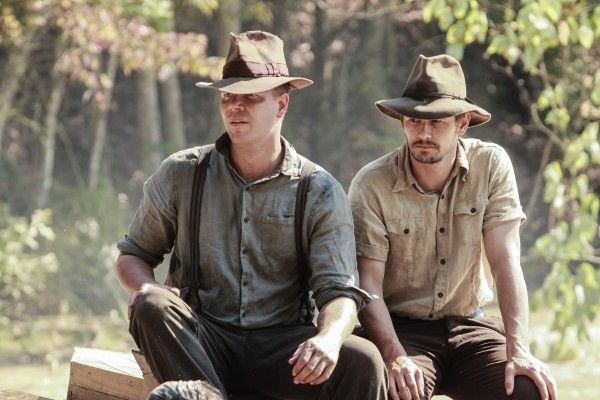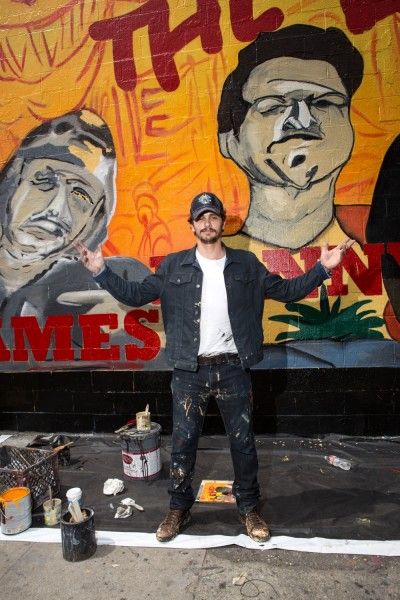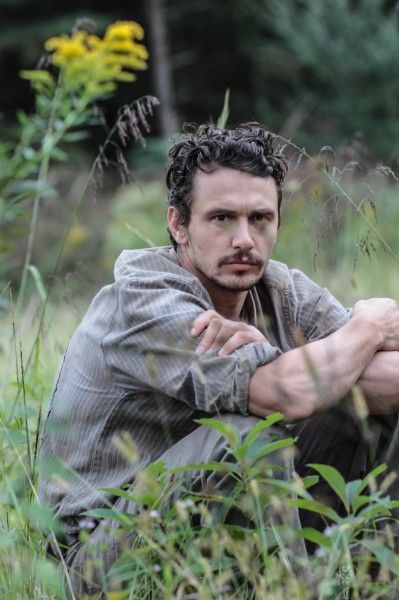Now playing in limited release and coming soon to VOD and DVD is James Franco’s adaptation of the 1930 classic American novel from William Faulkner, As I Lay Dying. Starring Franco,Tim Blake Nelson, Danny McBride, Ahna O’Reilly, Logan Marshall-Green, Beth Grant, and Jim Parrack, the film chronicles the Bundren family as they traverse the Mississippi countryside to bring the body of their deceased mother Addie to her hometown for burial. For more on the film, watch the trailer.
The other day I landed an exclusive phone interview with Franco. He talked about making the film, the challenges of adapting the book, the way his career has developed, how film school helped shape him as a filmmaker, future films like Bukowski and The Sound and the Fury, and how he balances being an actor with future directing projects. Hit the jump for what he had to say.
Collider: You don’t allow yourself to be pigeonholed—you’re an artist, you’re a director, you’re an actor, you teach, you do so many different things. Have you ever had any feedback from agents or managers or people in your camp being hesitant in the way you are leading your career?
JAMES FRANCO: No, certainly not now. They all understand that this is how I operate. A lot of this wasn’t planned this way, a lot of it I kind of just found. I found a way that all of it could work together, different things could work out for each other. Like teaching, for example, that’s something I never planned on doing. I was in school for quite a while and so many of my fellow students were graduate students and going on to teach, and it was something that kind of terrified me. I didn’t know what I could teach but—and then I realized once I could run some of my classes almost like production, then I realized, “Oh, I know how to do that.” I don’t know, I guess my people have just—they get it. This is how my career and my life developed around me and they kind of go with it.
You’ve directed for almost ten years, you’ve been behind the camera, you’ve done shorts, you’ve done documentaries, you’ve re-edited things. How have you changed as a director over the last eight years?
FRANCO: I guess I’ve never really thought about that but you’re right, I guess it’s been about ten years. The first feature I directed something called The Ape by co-director—I directed it but I co-wrote it with a woman named Merriwether Williams who’s a head writer on SpongeBob SquarePants. I did that one and a movie called Good Time Max before I went to the film school, and they were—I like them, I liked the movies, they’re quirky, they're very weird. Some of the motivation behind making those was that I’d been an actor for about eight years at the time and I realized that—I was coming to the realization that—film is a director’s medium. At least the way I understand it, it’s works best in the director’s medium. There I was as an actor in a director’s medium and I found that I was kind of kicking against the restraints of the parameters of my job as an actor, and so I just wanted to go and direct and see what that was like. I maybe went a little too far in my search for creative liberation because I didn’t, I made projects ... there were some people around me that were experienced, like the cinematographer and the editor but I didn’t really get a—I brought my friends on as producers and that kind of thing, so we were all kind of finding our way on those movies.
Instead of hiring an experienced producer who could say, “Alright James, I know what you’re aiming for but could you think about doing it this way?” I purposely didn’t do that and so I maybe didn’t make as polished a movie as I could have. Then I went to film school. Actually, the other thing about those early ones is that I was also kind of unsure about what kind of movies I wanted to make as a director. I was still sort of under this weird emotive, sad and trying to make movies in a certain way because certain ways “work”—or whatever that means. Instead of saying, “Okay, I’m the director, I’m initiating this project, I’m going to put in a year or two of work under this thing. Why am I not making the exact movie that I want to make?” Obviously, with the understanding that I’m making a movie, that the narrative’s still ... there are certain expectations, that I do want to make it for certain kind of audiences, etc. But why not the first criteria being make the movie and the story that you want to make?
Once I went to film school, I realized that, “Okay, what am I doing this for? This is your chance to make the movie that you want to make.” That led me to a lot of my favorite books and writers, and it also led me away from a lot of original screenplays. Some people work best that way. I found that I work best through adaptation. I feel like when I do that, I’m part of a tradition and I’ve been fortunate enough to be able to adapt some of my favorite books by some of my favorite writers—Cormac McCarthy and William Faulkner, and Charles Bukowski. When I do that, it also pushes me to up my game because I feel such a responsibility to the people I’m adapting. I try my absolute best. I don’t know maybe on the early films it's not that I was slacking, but I guess that what earlier films didn't have was just huge sense of obligation to the story because they were original screenplays. I guess those are all ... it's a long answer to your question about how things have changed. Now I think maybe we could say we wanted to define the approach of the movies I direct, to find literary sources that I love, that I see have maybe great characters but also they have something in the way that they’re written that quickly leads to find unusual cinematic approaches.
Jumping into As I Lay Dying, when you first sat down to start writing and work on the project, what was the one thing that you felt you had to really overcome to make it work?
FRANCO: I chose the book for several reasons but one of them is that I ... let me put it this way, when I chose the book I knew that I wanted to be loyal to the book—that I wanted to be loyal to the spirit of the book. That’s not always the case with every adaptation, sometimes you choose a book or a source and then you say, “I have one aspect that I like but we’re going to depart very far from it.” I hadn’t read "Oil!" but I think P.T. Anderson ended up departing pretty far from the original story. It’s not always the case when you say, “I’m going to be loyal” but in this case I said, “I want to be loyal, I want to capture the spirit of the book but I know that its structure is unusual, undimensional. Each chapter is told from a perspective of a different character, etc. There’s interior monologue that is very dense and all that.” I needed to find ways to capture this thing but I think what I had in the back of my mind is that As I Lay Dying was this idea that I heard Robert Altman talk about that there was a thru-line. You have that thru-line, it’s like a clothesline that you can hang all your other weird sort of laundry on.
As crazy as the structure of the book is, it’s still just about a family who is taking their mother’s body to town to be buried and that’s it. You have that very simple journey. And then all the stylistic things and structural oddities are kind of built on top of that but I knew that was in my favor, that the audience would be able to follow that, that they’re going to bury the mother and that’s life. I knew I had that in my corner and then I could make these leaps of, “Okay, how do I capture the multiple perspectives?” You kind of develop this idea that split screen to give the feel of multiple perspectives showing simultaneously. And then this kind of idea of capturing inner monologue through this almost like reality TV show confessional where the characters are looking directly at the camera as a way of making the voiceover strange. It’s not just conventional voiceover, it’s very jarring and unusual, but something that we’re also used to because of reality TV shows.
Those are all kind of things that we developed and ways of capturing the spirit of the book. So to answer your question, what I knew would be challenging was capturing the structure and the spirit of the book but I knew that I could go for it in a big swing because I had a very simple structure or very simple thru-line at the center.
You’ve already directed some other things like Bukowski and you might be doing The Sound and the Fury. Can you talk about the other things that you’ve directed that are coming in the future and what you’re thinking about beyond that?
FRANCO: Those are actually all true. I have a movie based on Cormac McCarthy called Child of God, and the plan is to premiere that at Venice Film Festival and then went to Toronto and the New York Film Festival. I don’t read ... unfortunately, I can’t read reviews anymore, which troubles me, but I heard that we got very, very, very good reviews on As I Lay Dying and Child of God. Bukowski is still being edited with film post production, we're hoping premiere that at the Sundance Film Festival. It’s about Bukowski’s youth—three periods of his youth—when he’s about eight, when he’s about thirteen, and then around eighteen to twenty years old. I just finished shooting Sound and the Fury in Mississippi; I’m now in Vancouver about ready to start acting with Seth Rogen and Evan Goldberg for The Interview, but I finished shooting Sound and the Fury a couple days ago. I will start that editing process pretty soon.
How are you trying to balance, as a filmmaker, acting gigs and directing? Is there any sort of thing that you’re setting up for yourself in terms of acting and directing a certain amount each year?
FRANCO: It’s not as if there's like a quota that I try to meet or anything like that but I do have—you kind of feel it out. It’s like, I know that the people respond to what I do—maybe with Seth [Rogen]—people respond to it, people like it, people come out in big numbers. But when I make a movie based on a Faulkner novel, it’s just not going to be the same kind of numbers. If I make them in a certain way, I can make my investors money back and I can continue to make those movies too. I also love doing the movies with Seth, just as an actor, and I get a lot of satisfaction out of that but I get a lot out of the other, too. I guess you could say it’s a balancing act but I guess I’m in a fortunate position where it’s not like it’s one for them and one for me. They’re both for me, they’re both very, very enjoyable but I also know that I do need to kind of balance certain things if I want to continue to be able to do all the things that I love. I do kind of keep it in the back of my mind. I have to go do the ones that lots of people love and then I can go and try the challenging ones that I know not as many people will love. But if I make them in the right way, it’ll make the money back and I can continue to make them.



